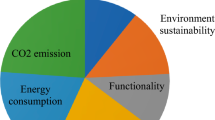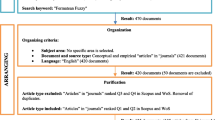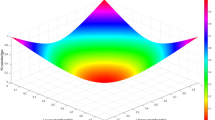Abstract
Aggregation operators perform a significant role in many decision-making problems. The purpose of this paper is to analyze the aggregation operators under the q-rung orthopair fuzzy environment with Yager norm operations. The q-rung orthopair fuzzy set is an extension of intuitionistic fuzzy set and Pythagorean fuzzy set in which sum of qth power of membership and non-membership degrees is bounded by 1. By applying the Yager norm operations to q-rung orthopair fuzzy set, we developed six families of aggregation operators, namely q-rung orthopair fuzzy Yager weighted arithmetic operator, q-rung orthopair fuzzy Yager ordered weighted arithmetic operator, q-rung orthopair fuzzy Yager hybrid weighted arithmetic operator, q-rung orthopair fuzzy Yager weighted geometric operator, q-rung orthopair fuzzy Yager ordered weighted geometric operator and q-rung orthopair fuzzy Yager hybrid weighted geometric operator. To prove the validity and feasibility of proposed work, we discuss two multi-attribute decision-making problems. Moreover, we investigate the influence of some values of parameter on decision-making results. Finally, we give a comparison with existing operators.





Similar content being viewed by others
References
Akram M, Adeel A (2018) Novel hybrid decision-making methods based on mF rough information. Granul Comput. https://doi.org/10.1007/s41066-018-00142-6:1-17
Akram M, Ali G (2019) Group decision making approach under multi (Q;N)-soft multi granulation rough model. Granul Comput. https://doi.org/10.1007/s41066-019-00190-6
Akram M, Ali G (2020) Hybrid models for decision making based on rough Pythagorean fuzzy bipolar soft information. Granul Comput 5(1):1–15
Akram M, Bashir A (2020) Complex fuzzy ordered weighted quadratic averaging operators. Granul Comput. https://doi.org/10.1007/s41066-020-00213-7:1-16
Akram M, Shahzadi G (2020) Decision making approach based on Pythagorean Dombi fuzzy soft graphs. Granul Comput. https://doi.org/10.1007/s41066-020-00224-4
Akram M, Dudek WA, Dar JM (2019) Pythagorean Dombi fuzzy aggregation operators with application in multi-criteria decision making. Int J Intell Syst 34(11):3000–3019
Akram M, Dudek WA, Ilyas F (2019) Group decision making based on Pythagorean fuzzy TOPSIS method. Int J Intell Syst 34(7):1455–1475
Akram M, Ali G, Shabir M (2020) A hybrid decision making framework using rough mF bipolar soft environment. Granul Comput. https://doi.org/10.1007/s41066-020-00214-6:1-17
Akram M, Garg H, Ilyas F (2020) Multi-criteria group decision making based on ELECTRE I method in Pythagorean fuzzy information. Soft Comput 24(5):3425–3453
Atanassov KT (2020) Intuitionistic fuzzy sets. Fuzzy Sets Syst 20(1):87–96
Bai K, Zhu X, Wang J, Zhang R (2018) Some partitioned Maclaurin symmetric mean based on \(q\)-rung orthopair fuzzy information for dealing with multi-attribute group decision making. Symmetry 10(9):383
Chen SM, Chen SW (2014) Fuzzy forecasting based on two-factors second-order fuzzy-trend logical relationship groups and the probabilities of trends of fuzzy logical relationships. IEEE Trans Cybern 45(3):391–403
Chen SM, Cheng SH (2016) Fuzzy multi-attribute decision making based on transformation techniques of intuitionistic fuzzy values and intuitionistic fuzzy geometric averaging operators. Inf Sci 352:133–149
Chen SM, Niou SJ (2011) Fuzzy multiple attributes group decision making based on fuzzy preference relations. Expert Syst Appl 38(4):3865–3872
Chen SM, Ko YK, Chang YC, Pan JS (2009) Weighted fuzzy interpolative reasoning based on weighted increment transformation and weighted ratio transformation techniques. IEEE Trans Fuzzy Syst 17(6):1412–1427
Chen SM, Chu HP, Sheu TW (2012) TAIEX forecasting using fuzzy time series and automatically generated weights of multiple factors. IEEE Trans Syst Man Cybern A 42(6):1485–1495
Chen SM, Cheng SH, Lan TC (2016) Multi-criteria decision making based on the TOPSIS method and similarity measures between intuitionistic fuzzy values. Inf Sci 367:279–295
Feng F, Fujita H, Ali MI, Yager RR, Liu X (2019) Another view on generalized intuitionistic fuzzy soft sets and related multi-attribute decision making methods. IEEE Trans Fuzzy Syst 27(3):474–488
Garg H (2016) A new generalized Pythagorean fuzzy information aggregation using Einstein operations and its application to decision making. Int J Intell Syst 31(9):886–920
Garg H (2017) Generalized Pythagorean fuzzy geometric aggregation operators using Einstein \(t\)-norm and \(t\)-conorm for multi-criteria decision making process. Int J Intell Syst 32(6):597–630
Garg H (2020) A novel trigonometric operation-based \(q\)-rung orthopair fuzzy aggregation operator and its fundamental properties. Neural Comput Appl. https://doi.org/10.1007/s00521-020-04859-x
Garg H, Chen SM (2020) Multi-attribute group decision making based on neutrality aggregation operators of \(q\)-rung orthopair fuzzy sets. Inf Sci 517:427–447
Jana C, Muhiuddin G, Pal M (2020) Some Dombi aggregation of \(q\)-rung orthopair fuzzy numbers in multiple-attribute decision making. Int J Intell Syst 34(12):3220–3240
Joshi BP, Gegov A (2020) Confidence levels \(q\)-rung orthopair fuzzy aggregation operators and its applications to MCDM problems. Int J Intell Syst 35(1):125–149
Khan AA, Ashraf S, Abdullah S, Qiyas M, Luo J, Khan SU (2019) Pythagorean fuzzy Dombi aggregation operators and their application in decision support system. Symmetry 11(3):383
Li DF (2019) Multi-attribute decision making method based on generalized OWA operators with intuitionistic fuzzy sets. Expert Syst Appl 37(12):8673–8678
Liu P, Liu J (2018) Some \(q\)-rung orthopair fuzzy Bonferroni mean operators and their application to multi-attribute group decision making. Int J Intell Syst 33(2):315–347
Liu P, Liu W (2019a) Multiple-attribute group decision making method of linguistic \(q\)-rung orthopair fuzzy power Muirhead mean operators based on entropy weight. Int J Intell Syst 34(8):1755–1794
Liu P, Liu W (2019b) Multiple-attribute group decision-making based on power Bonferroni operators of linguistic \(q\)-rung orthopair fuzzy numbers. Int J Intell Syst 34(4):652–689
Liu P, Wang P (2018) Multiple-attribute decision making based on Archimedean Bonferroni Operators of \(q\)-rung orthopair fuzzy numbers. IEEE Trans Fuzzy Syst 27(5):834–848
Liu P, Wang P (2019) Some \(q\)-rung orthopair fuzzy aggregation operators and their applications to multiple-attribute decision making. Int J Intell Syst 33(2):259–280
Liu P, Wang Y (2020) Multiple attribute decision making based on \(q\)-rung orthopair fuzzy generalized Maclaurin symmetic mean operators. Inf Sci 518:181–210
Liu P, Liu J, Chen SM (2018) Some intuitionistic fuzzy Dombi bonferroni mean operators and their application to multi-attribute group decision making. J Operat Res Soc 69(1):1–24
Liu P, Ali Z, Mahmood T (2019) A method to multi-attribute group decision making problem with complex \(q\)-rung orthopair linguistic information based on Heronian mean operators. Int J Comput Intell Syst 12(2):1465–1496
Liu P, Liu P, Wang P, Zhu B (2019) An extended multiple attribute group decision making method based on \(q\)-rung orthopair fuzzy numbers. IEEE Access 7:162050–162061
Liu P, Chen SM, Wang P, (2020) Multiple-attribute group decision-making based on q-rung orthopair fuzzy power Maclaurin symmetric mean operators. IEEE Trans Syst Man Cybernet
Lu M, Wei G (2017) Pythagorean uncertain linguistic aggregation operators for multiple-attribute decision making. Int J Knowl-based and Intell Eng Syst 21(3):165–179
Lu M, Wei G, Alsaadi FE, Hayat T, Alsaedi A (2017) Hesitant Pythagorean fuzzy Hamacher aggregation operators and their application to multiple-attribute decision making. J Intell Fuzzy Syst 33(2):1105–1117
Peng X, Selvachandran G (2019) Pythagorean fuzzy set: state of the art and future directions. Artif Intell Rev 52(3):1873–1927
Peng X, Yang Y (2015) Some results for Pythagorean fuzzy sets. Int J Intell Syst 30(11):1133–1160
Peng X, Yang Y (2016) Fundamental properties of interval-valued Pythagorean fuzzy aggregation operators. Int J Intell Syst 31(5):444–487
Peng X, Yuan H (2016) Fundamental properties of Pythagorean fuzzy aggregation operators. Fundam Inform 147(4):415–446
Shahzadi G, Akram M, Al-Kenani AN (2020) Decision making approach under Pythagorean fuzzy Yager weighted operators. Mathematics 8(1):70
Waseem N, Akram M, Alcantud JCR (2019) Multi-attribute decision making based on \(m\)-polar fuzzy Hamacher aggregation operators. Symmetry 11(12):1498
Wei G (2010) Some induced geometric aggregation operators with intuitionistic fuzzy information and their application to group decision making. Appl Soft Comput 10(2):423–431
Wei G (2017) Pythagorean fuzzy interaction aggregation operators and their application to multiple-attribute decision making. J Intell Fuzzy Syst 33(4):2119–2132
Wei G, Lu M (2018) Pythagorean fuzzy Maclaurin symmetric mean operators in multiple-attribute decision making. Int J Intell Syst 33(5):1043–1070
Wei G, Lu M (2018) Pythagorean fuzzy power aggregation operators in multiple-attribute decision making. Int J Intell Syst 33(1):169–186
Wei G, Lu M, Alsaadi FE, Hayat T, Alsaedi A (2017) Pythagorean 2-tuple linguistic aggregation operators in multiple-attribute decision making. J Intell Fuzzy Syst 33(2):1129–1142
Wei G, Gao H, Wei Y (2018) Some \(q\)-rung orthopair fuzzy Heronian mean operators in multiple-attribute decision making. Int J Intell Syst 33(7):1426–1458
Xu Z (2007) Intuitionistic fuzzy aggregation operators. IEEE Trans Fuzzy Syst 15(6):1179–1187
Xu Z, Yager RR (2006) Some geometric aggregation operators based on intuitionistic fuzzy sets. Int J Gen Syst 35(4):417–433
Yager RR, (2013) Pythagorean fuzzy subsets. In: 2013 Joint IFSA World Congress and NAFIPS Annual Meeting (IFSA/NAFIPS). IEEE: 57–61
Yager RR (1994) Aggregation operators and fuzzy systems modeling. Fuzzy Set Syst 67(2):129–145
Yager RR (2013) Pythagorean membership grades in multi-criteria decision making. IEEE Trans Fuzzy Syst 22(4):958–965
Yager RR (2016) Generalized orthopair fuzzy sets. IEEE Trans Fuzzy Syst 25(5):1222–1230
Zadeh LA (1965) Fuzzy sets. Inf Control 8(3):338–353
Zeng S, Chen J, Li X (2016) A hybrid method for Pythagorean fuzzy multiple-criteria decision making. Int J Inf Tec Decis 15(02):403–422
Zhao X, Wei G (2013) Some intuitionistic fuzzy Einstein hybrid aggregation operators and their application to multiple-attribute decision making. Knowl-Based Syst 37:472–479
Author information
Authors and Affiliations
Corresponding author
Ethics declarations
Conflict of interest:
The authors declare no conflicts of interest.
Additional information
Publisher's Note
Springer Nature remains neutral with regard to jurisdictional claims in published maps and institutional affiliations.
Rights and permissions
About this article
Cite this article
Akram, M., Shahzadi, G. A hybrid decision-making model under q-rung orthopair fuzzy Yager aggregation operators. Granul. Comput. 6, 763–777 (2021). https://doi.org/10.1007/s41066-020-00229-z
Received:
Accepted:
Published:
Issue Date:
DOI: https://doi.org/10.1007/s41066-020-00229-z




